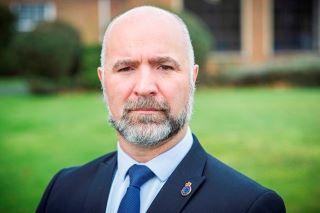
PFEW Health and Safety Lead Mark Andrews enumerates the challenges faced by police officers in general, and Long Covid in particular, as the virus keeps evolving.
When the pandemic struck two years ago, the Police Federation of England and Wales (PFEW) was one of the first staff associations in the country to deploy all its resources, and it continued to remain at the forefront of protecting officers throughout the pandemic.
During those trying times, the Federation pushed for unambiguous guidance to ensure workplaces remained safe for officers, constantly appealing to chief constables and the Government to provide Personal Protective Equipment (PPE) to officers and carry out regular testing and vaccinations across locations.
The pandemic has not gone away. People are still getting infected by various variants of the virus. PFEW has not lowered its guard and is working to ensure our officers remain protected while stressing the need to maintain Covid safety measures, when appropriate, and not to move forward as if Covid is no longer in existence or no longer a threat.
In doing so we are also fighting to get fair treatment for all officers who suffer from symptoms of Long Covid.
It is extremely concerning that many of our branches have raised worries over the number of police officers, who have or are suffering from Covid, are being failed by their respective forces. At work, these officers put themselves in harm’s way and when they are struck by this virus, they face disparity in treatment, with some facing a lack of care and understanding by the very forces they serve.
The Covid pandemic has been akin to none other. The virus is constantly evolving, and new studies keep throwing more light on its changing effects – Long Covid being one of them. The viruses’ effects, and after-effects, are not fully comprehended by many people.
However, failure on the part of forces to establish a coordinated approach in tackling Long Covid has resulted in far-reaching negative implications for the affected officers. The lack of mechanisms to define its diagnosis amongst officers has caused them to face disbelief and suspicion. Some of the officers fighting Long Covid have reported that their managers doubted their diagnosis and suspected if they were fighting Covid at all, while some others questioned the very symptoms the officers were exhibiting.
This needs to change.
It is particularly troubling to see officers, who underwent a period of sickness because of Covid or Long Covid, subjected unfairly to absence management processes. Some of them are facing stringent Unsatisfactory Performance Procedures.
The immediate fallout of the haphazard application of absence management processes is that some officers were forced to exploit paid leave, and others reported to work putting both their colleagues and members of the public at risk.
Additionally, a handful of forces considered retiring officers, suffering from Long Covid, on medical grounds.
Forces certainly need to find a better way to support officers who put their lives on the line day in and day out not just for the communities they serve and protect but also for their colleagues.
Of course, the sheer variety of Long Covid symptoms is one of the major contributing factors to the confusion faced by forces. Studies have found nearly 50 symptoms, one or more of which may be reported by people suffering from Long Covid.
Amongst these, commonly reported by most police officers are fatigue, shortness of breath, chest pain or discomfort, attention disorder, memory loss and joint pain.
Policing is a high-risk dynamic career which often calls upon quick decision-making. Exerting undue pressure on officers to report to work or continue in their role without appropriate adjustments can lead to catastrophic results both for the officers and members of the public.
Forces should be aware that Long Covid is old as the first cases of Covid-19 and some officers have now been suffering from its symptoms for 12 months or more.
According to the provisions of the Equality Act 2010 an individual is said to be disabled when faced with a condition, which has a substantial and long-term impact on their ability to execute normal day-to-day activities, for 12 months or more. This law also protects disabled police officers from discrimination, harassment, and victimisation.
Forces have a duty to take steps to ensure that disabled officers can access jobs as easily as non-disabled officers by carrying out reasonable adjustments at the workplace. Reasonable adjustments can include flexible working arrangements, longer rest breaks, and specialist software or equipment.
PFEW has been and will keep pushing forces to provide this protection to officers suffering from Long Covid whether they have had symptoms for 12 months or not. PFEW will also continue working with the National Police Chief’s Council and the College of Policing to periodically provide clear and detailed guidance to forces on supporting officers with Long Covid.
Our aim is to achieve parity of treatment for all officers, which is only fair and substantial, with the hope that by highlighting these issues our employers and the Government will get the message about the slow progress and the mammoth task ahead.














